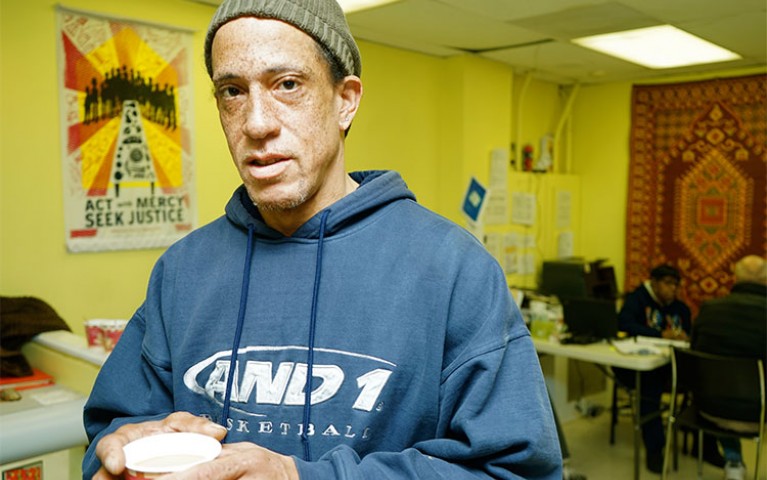We Belong to Each Other

From January to April, Project HOME operated the Hub of Hope, a winter walk-in engagement center located in the concourses beneath Center City for individuals experiencing chronic homelessness. These reflections were written by Karen Orrick, who managed the Hub.
Father Greg Boyle, founder of Homeboy Industries in Los Angeles and a dear friend of Project HOME, describes violence as stemming from “a lethal absence of hope. It’s about [people] who can’t imagine a future for themselves.”
How can we infuse our system, our services, our communities, and our world with more hope? How can we cultivate spaces that are safe, rejuvenating, and restorative?
This question was urgent for those of us who worked at this past winter’s Hub of Hope. Once again, we had many successes: Over 1,700 different persons visited the Hub, many of were connected to services, from healthcare to housing, from mental health to recovery, and were able to take positive steps toward breaking the cycle of homelessness. And the daily life at the Hub was marked by a deep sense of community among participants, volunteers, staff, and neighbors. Like a neighborhood coffee shop, people were able to be human across many lines of differences; they were able to joke, relax, work, inspire, check-in with, and support one another.
But it was also a tough winter. Much human brokenness and fragility came through the doors of the Hub. Our guests included persons with severe untreated mental illness, deep addictions, and a sense of profound alienation. Many of these persons were also experiencing anger and depression. We had some difficult moments, including episodes of aggression and conflict. We also saw upfront some of the more difficult realities affecting those on the streets—the increasing number of young persons, as well as the destructive effects of new kinds of drugs.
After one incidence of violence, we were concerned that a university partner would pull their student volunteers from the project. Instead, the volunteer coordinator responded that she was “sitting with the question of how such outbursts stem from fundamental, structural violence,” and added that she was “very grateful to be in partnership with an organization that is attentive to and responsive to not only the effects but the root causes.” She continued, “Please let me know of any support that we might be able to provide…as you continue to serve and support those who are in pain…and to embody compassion, strength, and courage.”
In a wounded world, we must reach for courage, for kinship, and for each other to remake a society that makes more sense. Environmentalist David Orr says, “The plain fact is that the planet does not need more successful people. But it does desperately need more peacemakers, healers, restorers, storytellers, and lovers of every kind. It needs people of moral courage willing to join the fight to make the world habitable and humane.”
At the Hub of Hope, hope was one of our main currencies for operating. Relationships were another. Hope and relationships were the basis of our economy of healing. People came out of every corner to make this project work. Joe from Philly Fair Trade Roasters wanted to provide all the coffee– even though he was assured that we served over 200 cups a day. Michelle wanted to come in every evening to sign people in. Tim worked in the building above and wanted to start his day talking to his downstairs neighbors. Terez brought cupcakes every Monday and muffins every Friday. Heather delivered over 100 pairs of socks.
Daniel, one of our guests, returned one day to show off his new house keys. Brandon, who had cussed us out last year decided that this year he wanted to go in to treatment. Bill, normally grouchy and reclusive, forged an unlikely friendship with our greeter.
Social programs work. Public infrastructure builds strong communities. In the midst of an ever tightening economic climate, we need to respond with vital resources and strong political will to fund solutions that will help us all heal.
We belong to each other. We are connected to one another deeply. We are wounded by our absence of contact with one another, and without our own sense of being part of the whole. One aspect of Project HOME’s mission is to “create a safe and respectful environment where we support each other in our struggles for recovery.” This recovery is for all of us to find, together.